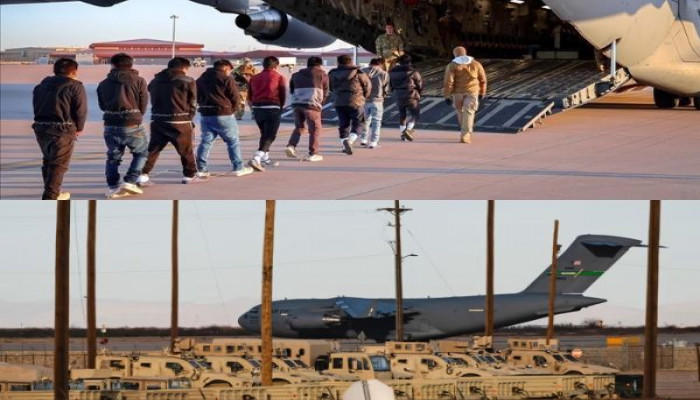US sends deported criminals to Eswatini an absolute monarchy
- In Reports
- 07:01 PM, Jul 17, 2025
- Myind Staff
The Eswatini government confirmed that it had taken in five individuals deported from the United States during President Donald Trump's tenure
In a statement on Wednesday, a government official said the deportations followed months of high-level discussions
The five deportees were placed in correctional facilities in isolated units where similar offenders are kept, spokesperson Thabile Mdluli said
She acknowledged human rights concerns, especially when the deported individuals were not originally from Eswatini
She stated that Eswatini, as a responsible global citizen, follows international commitments and diplomatic norms during repatriations, ensuring due process and human rights for those affected
Mdluli added that the government would work with the International Organisation for Migration to help transfer the deportees to their countries of origin.These deportations were part of a broader Trump administration policy to remove foreign nationals to third countries rather than their home nations
The White House justified the approach by claiming that some home countries refused to accept deportees. Critics argued that sending people to countries with poor human rights records placed them in danger.
Concerns also grew that the administration was carrying out deportations so quickly that individuals lacked time to challenge their removal in court.
On Tuesday, the US Department of Homeland Security confirmed a deportation flight and listed the passengers as nationals from Laos, Vietnam, Jamaica, Cuba, and Yemen.
A Homeland Security official named McLaughlin posted on social media that the Eswatini-bound flight had deported individuals whom their own countries would not accept. She described the deportees as brutal and uncivilised and accused them of crimes like murder, assault and child rape, calling them depraved monsters who had terrorised American communities
President Trump has frequently used the term undocumented immigration as an invasion and regularly linked undocumented immigrants to crime, although research has shown they commit fewer crimes than U.S.-born citizens. Since returning to the office in January for a second term, Trump has pushed for mass deportations, including to countries like El Salvador and South Sudan.
In March, around 200 Venezuelans were deported to El Salvador, where they were detained in a maximum-security terrorism centre with shaved heads and conditions described by some as torture. The US reportedly paid the Salvadoran government nearly six million dollars to house the deportees.
In May, reports revealed plans to deport immigrants to Libya. Though a federal court blocked that effort and Libyan officials denied involvement, lawyers said a deportation flight had already been arranged and was stopped only on the airport tarmac due to the court order
Later in May, another deportation flight carried eight people to South Sudan, a country the US State Department itself has flagged for serious human rights abuses, including torture, extrajudicial killings and deadly prison conditions. The flight was eventually diverted to Djibouti after a federal court in Massachusetts ruled that the deportees had not been given a fair chance to contest removal
The individuals on that flight came from countries like Laos, Mexico, Myanmar, Cuba and Vietnam.
On June 23, the US Supreme Court issued a short, unsigned order overturning the lower court’s decision and allowing the deportation to South Sudan to proceed.Three liberal justices dissented in a 19-page opinion, warning of presidential overreach.
Justice Sonia Sotomayor wrote that the Government had shown it believed it could deport anyone anywhere without notice or a hearing. She added that there was no evidence the US had confirmed that Libya, El Salvador or South Sudan would not torture the deportees.
Human rights organisations also expressed concern about deportations to Eswatini, a country of around 1.23 million, bordering South Africa.
Eswatini is an absolute monarchy led by King Mswati III, who has faced criticism for violently suppressing opposition. Security forces killed several protesters during pro-democracy demonstrations in 2021 and some were later imprisoned for inciting violence, a charge many believe was used to silence dissent.
Despite this, the Eswatini government defended its human rights record and said its decision to accept the deportees served both nations’ interests. The government’s statement highlighted its long-standing diplomatic ties with the US spanning over five decades and said all agreements were made with full consideration of mutual priorities.
An internal memo viewed by The Washington Post this week suggested that the Trump administration deliberately deported individuals to countries where human rights protections were not guaranteed.
The July 9 memo said Immigration and Customs Enforcement could proceed with third-country deportations without diplomatic assurances against torture if certain conditions were met. It also said deportations could be carried out with as little as six hours’ notice in urgent situations.







Comments